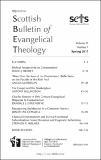Classical trinitarianism and eternal functional subordination : some historical and dogmatic reflections
Abstract
Within Anglophone evangelical theology and church life there has been much debate in recent months over the idea of ‘eternal functional subordination’ (EFS) or ‘eternal relationships of authority and submission’ (ERAS). To ask whether EFS/ERAS are adequately trinitarian we must first define ‘trinitarian’. Following Barnes, I argue that the only possible definition is historical. To be ‘trinitarian’ is to hold to the doctrine developed in the fourth-century debates. By insisting on a strong distinction between the divine life in se and the economic acts of God, I rule out any appeal to, for instance, the pactum salutis in an attempt to defend EFS/ERAS. A consideration of the Father-Son relationship suggests two possible defences of such positions, one relying on finding an eternal analogue to the economic ordering of the divine acts, and the other pressing ‘Father-Son’ language to suggest that the relationship of eternal generation might entail something like EFS/ERAS. An examination of what must be said concerning the simple divine essence, however, excludes both these possibilities. I argue, therefore, that EFS, ERAS, or any similar doctrines are incompatible with classical trinitarianism.
Citation
Holmes , S R 2017 , ' Classical trinitarianism and eternal functional subordination : some historical and dogmatic reflections ' , Scottish Bulletin of Evangelical Theology , vol. 35 , no. 1 , pp. 90-104 .
Publication
Scottish Bulletin of Evangelical Theology
Status
Peer reviewed
ISSN
0265-4539Type
Journal article
Collections
Items in the St Andrews Research Repository are protected by copyright, with all rights reserved, unless otherwise indicated.

